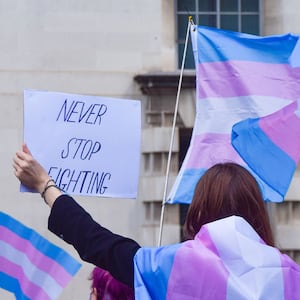Every damn day there is something, someone, some group that is trying to steal our joy.
Donald Trump is back to bashing and mocking transgender women athletes on the campaign trail. Proud Christian nationalist Rep. Marjorie Taylor Greene of Georgia tweets about Admiral Rachel Levine’s anatomy and deadnames her, violating Twitter rules for hate speech.
A Republican candidate for a Florida school board says doctors who provide gender-affirming care should be hanged, while Gov. Ron DeSantis’ administration isn’t stopping at “Don’t Say Gay.”
Health-care workers and schools are instructed to ignore federal guidelines on supporting trans youth, while the Sunshine State moves ahead with plans to ban transition care for kids and adults on Medicaid.
The list goes on, from anti-inclusion TERFs to Texas Republicans, from the ADF to Martina Navratilova and so-called “gender critical” Britons who don’t hide their hatred for us, just for being transgender. Just for existing. It’s clear their goal is to not just to erase our joy, but to stop us from living authentic lives.
“With some of the laws out there, some of the bans, things are not moving in a great direction, in terms of trans rights,” said psychotherapist Nat Jones-Sikes, a trans man who counsels trans patients at Transhealth in Western Massachusetts. “It’s scary times out there right now.”
Jones-Sikes said he encourages his therapy clients to look for and explore their joy.
“There are misconceptions about therapy only being a space for difficult things. I think it’s a place to celebrate joy, too,” he said.
Out trans journalists and advocates have explored this territory before: Tech reporter Ina Fried of Axios keeps her own Joy List. Gillian Branstetter of the ACLU credits trans TikTok performer Dylan Mulvaney with inspiring their joy. As far as back as 2018, award-winning author Thomas Page McBee wrote in them: “Joy in a marginalized body has always been a form of resistance entwined with the politics of queerness.”
“Joy is a crucial element of people’s everyday lives that has been understudied by sociologists,” write researchers Stef Shuster of Michigan State University and Laurel Westbrook of Grand Valley State University. Last week they published a study on trans joy titled, Reducing the Joy Deficit in Sociology. Despite all the reasons to lose hope, 40 trans people told the researchers they found joy in being transgender.
“We found that transgender people expressed joy in being members of a marginalized group and said that they preferred being transgender,” they reported. Schuster and Westbrook expressed surprise at learning that “embracing a marginalized identity caused the quality of their lives to improve, increasing self-confidence, body positivity, and sense of peace.”
I asked trans people on Facebook and Twitter, what it is about being trans that brings them joy, and they did not hold back.
Julie Anne Morgan of Phoenix told me: “Waking up every day to see what the tide brings in, and working on being the best me I can be.” Karen Adell Scot of Southern California said, “Caring for and being kind to others.”
“Reading about all the hate our uneducated legislators are promoting could cause me to go into a major depression causing me to turtle from the world,” wrote Aidan Whittel, a disabled trans man in Connecticut who works for a major insurance company and is an activist with the TransAdvocacy Coalition.
“I find joy in finally at age 60 being my confident true self,” he wrote. “I have found my voice for advocacy and thrive helping others within the transgender community. I am visible and open to be an example. I will do anything in my power to prevent others from going through the heartache and pain I suffered finding my place in the world as a man of transgender experience. I choose to be an advocate and not to turtle. I chose the joy of action versus the despair of hiding.”
Like a lot of respondents from around the world, Jennifer Moser of Illinois finds joy in music. But specifically, she said, karaoke, which she’s been enjoying since 2013, which was the first time she sang in public as her authentic self. Moser recently celebrated her 50th birthday with friends and family.
“Above all, the love of my family” is what author and scholar Jennifer Finney Boylan tweeted brings her joy.
Boylan, 64, came out at age 40. “As the millennium turned, I felt I’d done everything I could EXCEPT come out.” But like many trans people, she says knew who she was at a young age; In her case, at 6. As a co-author with Jodi Picoult of the forthcoming Mad Honey, a professor at Barnard College in New York City and a 2022-23 Fellow at Harvard's Radcliffe Institute for Advanced Study, Boylan calls herself “happy and successful, although not without sorrows and setbacks.”
There were several folks who responded that joy was elusive, or impossible. Like Sophie Lynne, who tweeted, “I don’t have any joy. Ever.”
A trans man who requested anonymity wrote about the darkness that erases any chance for joy.
“Personally, I’ve been having a very hard time. All the normal problems of life and healthcare that we are all dealing with, plus the near certainty that we are heading towards ‘liquidation.’ What else is there to do but batten down the hatches and support my community?” he wrote. “I’ve been ‘in the game’ for a long time, and this is the worst it’s ever been, or at least the sharpest downturn. I have zero faith in the government to come through for us no matter how blue I vote. I also am at risk of pregnancy, so I’m really feeling the pressure. All in all, I fully, 100% seriously expect to be dead in the next five years. We had our chance, and we squandered it. They’re gonna round us up.”
Gwendolyn Ann Smith, the journalist credited with organizing the first Transgender Day of Remembrance, acknowledged that “some days, just making it through the day in one piece” is how she finds joy, but also reflected on the power of witnessing our resilience.
Model, activist and Instagram celebrity Rose Montoya of Los Angeles said she first found joy in being trans when Laverne Cox visited her college campus seven years ago. “Hearing her story was so compelling, because it was my story.” Montoya, 26, identifies as trans, Latine, bisexual and nonbinary, and told me she’s dealt with bullies all her life, when she identified as a gay boy, and now on social media. So she’s used her platform to educate and advocate. But it comes with a price.
“I’m exhausted,” she said. “After Pride month, I’ve been focusing on resting and recharging. I find joy in taking a break. There’s so much more work to be done and more fighting for change needed, but I cannot continue to pour from an empty cup. I’ve been surrounding myself with my family, chosen family, friends, and my partner.”
Kara Mailman, 30, is a nonbinary transmasc in Washington, D.C. They are living proof that being surrounded by affirming, supportive people can be a source of personal joy.
“I’ve found an incredible partner, my friendships have stayed strong, and my workplace is very trans-friendly,” they told me. “I’ve definitely had some struggles, specifically with explaining to my parents how my gender works, but overall I’m so, so glad I was able to safely come out!”
Jones-Sikes said that while “joy” clearly has different meanings for different people, he sees joy in two dimensions: “There’s joy that you have within yourself, but then there’s the joy you find externally: Being able to be seen and heard by the people closest to me, and where I work. Internally, there’s so much beauty in discovering yourself, and feeling confident as well. Feeling self love, and being my authentic self.”







